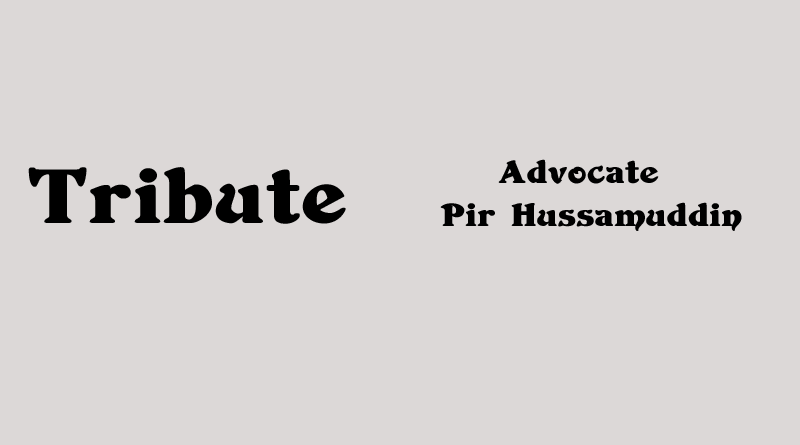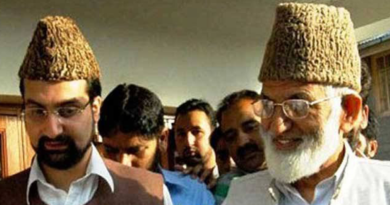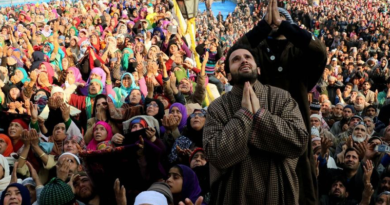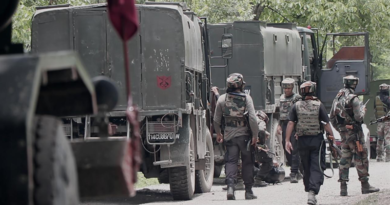A Tribute to the Late Pir Hussamuddin Advocate
Time and place determine the value of a thing. A carpet, for example, placed in a showroom at London or New York is a much more valued item than the same in a showroom at Srinagar. Not only place, time also makes difference: the same carpet if put on sale in peak season would fetch much more than it would in an off-peak season. That, however, is the realm of inanimate things whose value and worth lies in the eyes of beholder, one would not normally say the same thing about animate beings, much less about humans. Human beings have an intrinsic value and dignity, independent of external appreciation. However, that does not mean time and place do not have any relevance here; they are very much relevant, in a different way though, and yet again, in a much more crucial way. History is full of examples where time and place have made a crucial difference to the value of a particular person, but before going into that let us see the simple logic behind it.
Every human being at the time of birth is a completely developed animal, but only a potential human, endowed with every thing that is required for becoming a true human being with a fully cultivated humanity. While remaining on the animal level, and not making a conscious and constant effort to nurture one’s human potential, reduces this apparently born human being to what the noble Quran says ‘lowest of the low’ i.e. an ignoble state far lower than animals. So the value and worth of a human being solely rests on his/her humanity, which in turn is based on faith and knowledge, the two exclusively human(as opposed to animal) faculties. True faith necessarily branches out into good deeds. These three elements, knowledge, faith and good deeds keep interacting with each other, one reinforcing the other, and this never-ending interaction turns life into a conscious, focussed, purposeful and goal-oriented journey to perfection, full of challenge, with Allah (SWT) as the final destination, and the Aim of all aims.
Two vital things need to be noted here:
One, this journey takes place through the medium of history and NOT in a vacuum; two, test (‘ibtila’ in Quranic terminology) is that divine strategic tool on which depends the pace and the ultimate fate of this journey. Sometimes, Allah (SWT) puts His chosen slaves to particular tests, as for example the great prophet Ibrahim (ASWS) who was asked to sacrifice His son, but apart from that an on-going process of testing the believers in general is always there. The noble Quran mentions of a people being tested by another people. In every changing situation there is a clear possibility of test. Those who conduct themselves properly keep progressing on the journey of perfection. It often happens that ordinary mortals conduct themselves so rightly in a particular situation that they are elevated to higher stations on this journey. All situations are not alike; some are more crucial than others. A single moment in time sometimes decides the future course of history for centuries to come. Imagine that historical statement of conviction by a few brave souls of Bani-Isreal led by Commander Talut on encountering a huge army:
“How often, by Allah’s will, hath a small force vanquished a big one? Allah (SWT) is with those who steadfastly persevere”(2:249). With this statement and a sincere prayer to Allah(SWT) for victory and steadfastness, these souls marched ahead, prophet Dawood killed Goliath and the foundations of a great and legendary empire of bani-isreal were laid. From the slavery of Firon to a state of glory and honour, history was made in a moment by these handful of believers who ventured ahead, and did not get intimidated by Golaith’s army as the majority of Talut’s followers had. They were not any special kind of people; very ordinary mortals with a definite historical outlook, but the way they conducted themselves in that extremely decisive situation made them great. The more crucial and decisive a situation, the more important becomes the question of human conduct, and the more rewarding or otherwise becomes the rightness or wrongness of this conduct. The right conduct in a situation not only leads to spiritual elevation of the believer, it enhances manifold his or her historical value and significance: he or she comes to seriously matter in history by making a real difference. Here, one must not ignore or underestimate the strategic dimension of this conduct. Believers conduct themselves according to not only what is right and wrong, but also what at a particular time and place is historically productive and useful. There can be absolutely no right time for doing a wrong thing, but, for doing a right thing, there can be right and wrong times. The noble Quran which basically is a book of guidance for mankind, is also, among so many other things, the most authentic treatise of history. It informs us about a believer in Firon’s court, perhaps from latter’s family, who had concealed the fact of his being a Muslim (the believer). It is highly instructive to note how this Believer conducted himself at the most crucial times in the history of bani-Isreal. After keeping a low profile for quite some time, he brought a secret message to Prophet Musa (ASWS) from the inner circles of the ruling regime, that Firon had decided to kill him i.e. Musa, so he better leave Egypt. Musa fled the country, but imagine how crucial this message was to all that happened subsequently, and also how well timed it was: if Musa was not forewarned, the worst could have happened (what was destined to happen is a different thing, and we are not talking here from that angle). Later, when prophet Musa returned to Egypt as an appointed prophet of Allah (SWT) to start his mission, a confrontation between Islam and Fironism started which intensified with each passing moment, reaching a stage where Firon in sheer desperation said to his courtiers “leave me to slay Moses”(40:26). At this point in time, the believer in Firon’s court, making the historical decision of coming out in open, got up and said “Will you kill a man because he says my Lord is Allah (SWT)”(40:28). The Believer continued his speech turning also to his fellow countrymen, and what followed is history: It is not difficult to understand how strategically significant and well-timed was the Believer’s decision to make an intervention in this battle of good and evil.
The points discussed above, no doubt very fundamental to Islamic thought, do not form, per se, my subject of discussion here. These have been raised only to provide a necessary ideological backdrop to what I am, at the moment, concerned with, namely, paying tributes to Pir Hissam-ud-din advocate who was recently assassinated in his house by Indian agents. If it has to be more than, rather different than, a mere customary tribute, then I have to very truthfully state what I felt, and more important than that, what I thought, on hearing this sad news. After all, it is not the question of feelings alone; it is more about thoughts. If it was merely about feelings, I would express them as best as I could, but would not bother much to make sure that others share my feelings, or I share those of others; for that matter who shares whose in real terms? That is easier said than done. In the world of feelings one is often left alone, because feelings are unique to a particular soul, and the more sincere and profound they are, the more unique they become. I had to construct a proper intellectual framework because there are some thoughts to be conveyed, and I do wish my readers to share my world of thoughts. But before that let me express my feelings first: I really felt at the demise of br. Hissamuddin. It was a feeling of shock and anger, shock at the gruesome event, anger for the elements who did it. I knew Hisamuddin, had talked to him, and he had been my guest at my ancestral house in Nawpora, Srinagar for a night way back in 1986. He had recently returned from England (United Kingdom) and had kindly come to meet me in my capacity as the Nazim-I-A’ala of Islami Jamiat-I-Talaba, J&K. A close associate and a senior office bearer of IJT, was also present. To put things in context, it needs to be recalled that we had then whole-heartedly supported the Islamic revolution of Iran, its leadership and its political vision, and IJT had, therefore, acquired a revolutionary image, not considered West-friendly. We talked in a very brotherly and cordial atmosphere, with the visiting guest trying to impress upon me the need of getting international support for Kashmir, particularly that of the West. I kept on listening to the sincere words, not getting excited though, and reacting at some points, for example, when br Hisamuddin said about UK’s parliament, that it was the mother of parliaments, to which I replied back saying yes it is this mother who gave birth to Isreal.
Now, coming to thoughts that br Hisamuddin’s killing aroused, I regarded it as a considerable loss for the present movement. The reason was simple: A sincere man who was at the right place at the right time doing right things, had been removed by the enemies of the cause of Kashmir and Islam. Hisamuddin was no doubt an Islamic oriented person, but his importance derived from his proper political positioning: he provided a moral and intellectual support to the leader of the freedom movement Mohtaram Syed Ali shah Geelani. As I see it, there was no better and more effective way available to the late brother, at the place and time he lived in, for reinforcing the historical forces of ‘haq’ the truth, other than what he had opted for. Every sincere person must choose how best he or she can side with the forces of ‘haq’ in a given historical setting. As the Kashmir problem is ostensibly moving towards a resolution, more and more interest groups in and outside Kashmir (more outside than in) are getting involved with the movement thus adding to its complexity. However, what is becoming more and more urgent in this context is the presence of an authentic and credible voice inside Kashmir that articulates the Issue and the real aspirations and the agony of the people not only from the last fifteen years (during which a lot of external influences have sought to disrupt the historical continuity of the Kashmir movement) but right from the time of India’s occupation of Kashmir in 1947. (After all when has Kashmir been painless in the last 57 years?). Syed Ali Shah Geelani is expected to precisely deliver that——act as the authentic voice.
To conclude, let me again emphasize that it is mainly br Hisamuddin’s role in strengthening Syed Ali Geelani’s leadership in Kashmir, that makes me pay very rich tributes to him now. Being away from Kashmir I had not met the deceased for quite some time but I remained fully updated about his political activities. When deciding to pay tributes, I could have, but I did not, enquire from those who knew him closely, what was br Hisamud-din’s size of beard these days, or how many optional fasts or salat he used to perform or how many umras he had recently gone for. Not that these are any trivial matters, far from that, but simply that they are deeds which, if the deceased had done, would have added to his personal earnings in the hereafter, but would have not made him relevant for others like myself. Relevance comes from the historical role, and it is through this role that one influences history transcending the here and now. That is the basic point I have been trying to make in this write-up right from the start: Islam’s absolute and clear emphasis on the historical role of believers. I talked about great people mentioned in the noble Quran, not with the purpose of comparing br Hisamuddin with them (who am I to do that, it is the Divine judgment that ultimately decides who is equal to whom, all that we can and should do is to sincerely pray that Allah (SWT) include him in those on whom He (SWT) bestowed His favours like the ones I mentioned above), but precisely with the purpose of highlighting the importance Islam attaches to historical role and responsibility of believers. I am afraid this point is not taken as seriously as it deserves to be, by Muslims in general. We need to talk about it in detail and depth, but not now. Here it would suffice perhaps to get an idea of how important this point is by placing it in perspective: Islam, when a person comes into its fold, gives him/her a clear name or an identity (He i.e. Allah (SWT) has named you Muslim 23:78), it enlightens the believer’s mind with a worldview and based on that reinforces the soul with a set of firm beliefs or ‘iman’. Next, it prescribes a code of conduct for us (the do’s and don’ts, for example), and last but definitely not the least, it assigns a historical role to us: how should we conduct ourselves in a given historical situation. That is a complete package: Islam, when it says who you are, at the same time lays down what you ought to do, not merely in the limited sphere of family but in the wider domain of history and civilization. The believers are commanded by Allah (SWT) in the most explicit terms to properly position themselves on the stage of a history, so as to effectively form a force of Good as opposed to that of Evil in historical terms.
***
Dr. Syed M Inayatullah Andrabi is a well-known figure in the circles of political Islam. Born in Srinagar, the capital city of Indian Held Kashmir, Dr Andrabi has been intimately involved at the intellectual level with the global politics and political issues since his student days in 1980 at Pune (India), where he completed his Ph.D. in Linguistics in 1983 at the Centre of Advanced Study in Linguistics, Deccan College, University of Pune, Pune, India. Upon completing his doctorate he returned home to join the University of Kashmir, first on a post-doctoral fellowship and later as faculty, but could not continue because of the deteriorating security situation in Kashmir, and had to move to United Kingdom in 1994 where he continues to live since along with his wife and five children.




